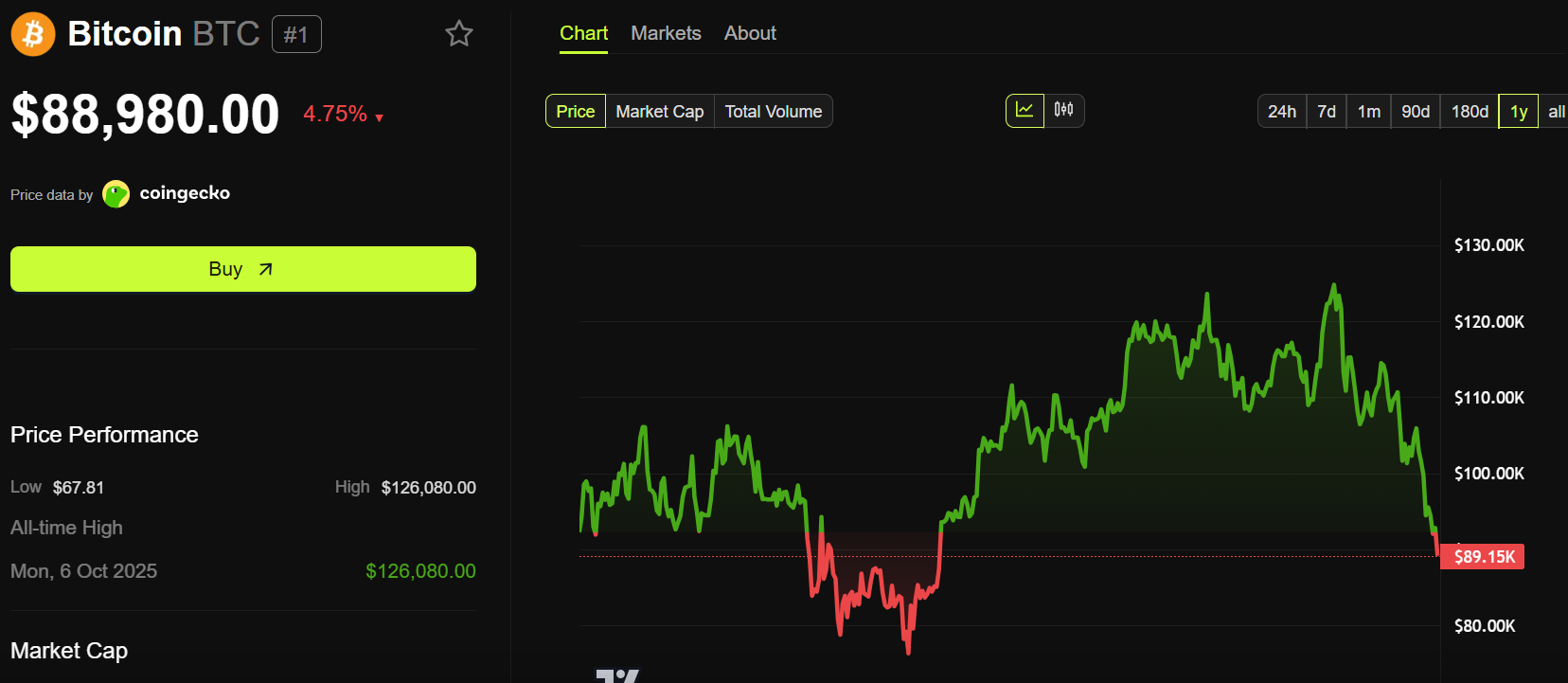Fed Minutes Reveal December Rate Cut on a Knife’s Edge, Bitcoin Slips Below $89,000
The latest FOMC minutes reveal December is now a razor-thin policy call, with a narrow majority leaning against a rate cut. Liquidity stress, tariff-driven inflation, and Bitcoin’s fragile momentum are all feeding into one of the Fed’s most delicate decisions in years.
The Federal Reserve’s newly released minutes from the October 28–29 meeting have thrown fresh uncertainty into the December policy outlook, sharpening market volatility across equities, bonds, and Bitcoin.
While the minutes reflect economic data only available at the time of the meeting, the language shift inside the document has become the latest flashpoint for analysts dissecting the Fed’s next move.
Fed Minutes Expose a Narrow Majority Against a December Rate Cut
The Fed described “many” officials as seeing a December rate cut as “likely not appropriate,” while “several” said a cut “could well be appropriate.”
In Fed-watcher parlance, the hierarchy matters. “some” > “several”, and “many” outweighs both. This indicates that a narrow majority opposed cutting rates in December at the time of the meeting.
💥BREAKING:FOMC MINUTES: – MANY SAW DECEMBER RATE CUT AS LIKELY NOT APPROPRIATE– SEVERAL SAID DECEMBER CUT 'COULD WELL BE' APPROPRIATE
— Crypto Rover
The minutes also indicated emerging stress points in money markets:
- Repo volatility,
- Declining ON RRP usage, and
- Reserves drifting toward scarcity.
This combination historically preceded the end of quantitative tightening (QT). Sentiment, therefore, is that the Fed may be closer than expected to ending balance-sheet runoff.
Ahead of this release, markets had already de-risked, with the Bitcoin price slipping below $89,000 to a 7-month low. The sentiment spread across crypto stocks and TradFi indices.
 Bitcoin (BTC) Price Performance. Source:
Bitcoin (BTC) Price Performance. Source:
Macro traders say the real story is the razor-thin nature of the Fed divide. The minutes indicate no firm consensus, suggesting December is shaping up to be one of the tightest policy calls since the Fed began its inflation fight.
Some officials emphasized still-elevated inflation risks; others pointed to cooling labor conditions and fading demand. With both sides arming themselves with recent post-meeting data, including softer CPI, stable jobless claims, and cooling retail activity, December could swing on the next two data prints.
For now, the market is recalibrating to a scenario where liquidity is tightening, policy uncertainty is rising, and Bitcoin sits in a structurally vulnerable zone until buyers regain initiative.
If the Fed chooses to hold in December, markets may need to brace for a longer-than-expected plateau and more volatility ahead.
Disclaimer: The content of this article solely reflects the author's opinion and does not represent the platform in any capacity. This article is not intended to serve as a reference for making investment decisions.
You may also like
Bolivia’s Digital Currency Bet: Navigating Volatility with Stable Solutions
- Bolivia's government permits banks to custody cryptocurrencies and offer crypto-based services, reversing a 2020 ban to combat inflation and dollar shortages. - Stablecoin transactions surged 530% in 2025, with $14.8B processed as Bolivians use USDT to hedge against boliviano depreciation (22% annual inflation). - State-owned YPFB and automakers like Toyota now accept crypto payments, while Banco Bisa launches stablecoin custody to expand financial inclusion for unbanked populations. - The policy faces c

Switzerland's Postponement of Crypto Tax Highlights Worldwide Regulatory Stalemate
- Switzerland delays crypto tax data sharing until 2027 due to ongoing political negotiations over OECD CARF partner jurisdictions. - Revised rules require crypto providers to register and report client data by 2026, but cross-border data exchange remains inactive until 2027. - Global alignment challenges exclude major economies like the U.S., China, and Saudi Arabia from initial data-sharing agreements. - Domestic legal framework passed in 2025, but partner jurisdiction negotiations delay implementation u

Visa and AquaNow Upgrade Payment Infrastructure through Stablecoin Integration
- Visa partners with AquaNow to expand stablecoin settlement in CEMEA via USDC , aiming to cut costs and settlement times. - The initiative builds on a $2.5B annualized pilot program, leveraging stablecoins to modernize payment infrastructure. - Visa's multicoin strategy aligns with industry trends, as regulators and competitors like Mastercard also explore stablecoin integration. - Regulatory progress in Canada and risks like volatility highlight evolving opportunities and challenges in digital asset adop

Bitcoin Updates: Large Holder Liquidations and Retail Investor Anxiety Lead to a Delicate Equilibrium in the Crypto Market
- A long-dormant crypto whale sold 200 BTC after a 3-year hibernation, intensifying market scrutiny over investor sentiment and liquidity shifts. - Bitcoin struggles above $92,000 amid weak technical indicators, mixed ETF flows ($74M inflow for BTC vs. $37M ETH outflow), and diverging institutional/retail behaviors. - Whale activity highlights fragile market balance: large holders accumulate BTC while retail investors liquidate, with over $557M in BTC moved from Coinbase to unknown wallets. - Technical bea
